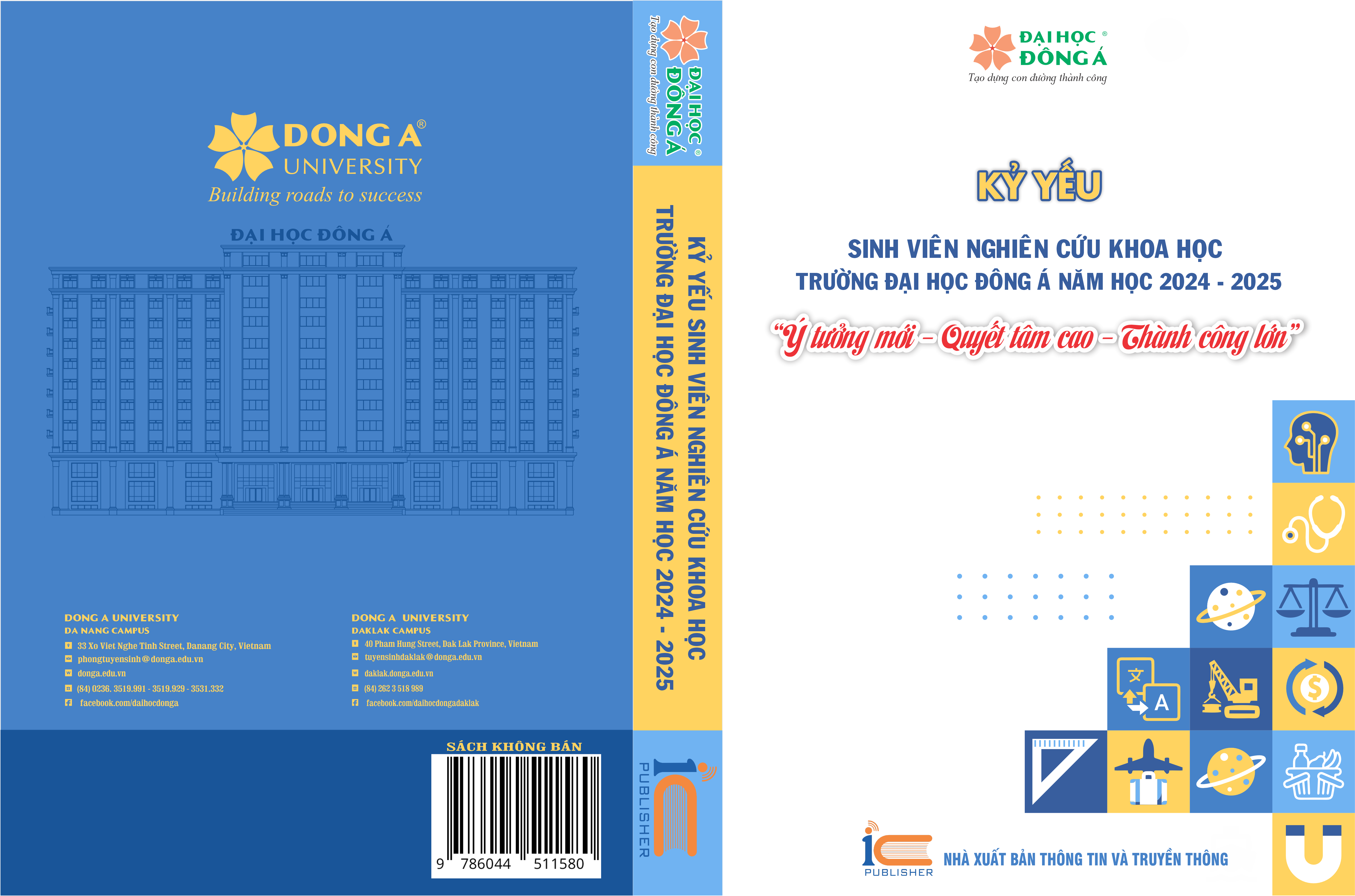CÁC YẾU TỐ ẢNH HƯỞNG ĐẾN Ý ĐỊNH HÀNH VI CỦA NGƯỜI TIÊU DÙNG ĐỐI VỚI VIỆC ÁP DỤNG CÔNG NGHỆ BLOCKCHAIN TRONG TRUY XUẤT NGUỒN GỐC HÀNG NÔNG SẢN TẠI ĐÀ NẴNG
Nội dung chính của bài viết
Tóm tắt
Nghiên cứu này nhằm tìm hiểu các yếu tố ảnh hưởng đến ý định hành vi của người tiêu dùng đối với việc áp dụng công nghệ blockchain trong truy xuất nguồn gốc nông sản tại Đà Nẵng. Trong bối cảnh người tiêu dùng ngày càng quan tâm đến chất lượng, an toàn thực phẩm và minh bạch nguồn gốc, blockchain được xem là giải pháp công nghệ hiệu quả và đáng tin cậy. Dựa trên mô hình UTAUT mở rộng, nhóm nghiên cứu đã khảo sát 300 người tiêu dùng và kết quả chỉ ra rằng các yếu tố như kỳ vọng hiệu suất, ảnh hưởng xã hội, điều kiện thuận lợi, tính minh bạch của sản phẩm và nhận thức tin tưởng đều có ảnh hưởng tích cực đến ý định hành vi; riêng kỳ vọng nỗ lực không có tác động đáng kể. Từ đó, nghiên cứu đề xuất một số định hướng cho doanh nghiệp và cơ quan quản lý nhằm nâng cao hiệu quả triển khai công nghệ blockchain trong chuỗi cung ứng nông sản, góp phần xây dựng một thị trường minh bạch và an toàn hơn cho người tiêu dùng.
Chi tiết bài viết

This work is licensed under a Creative Commons Attribution-NonCommercial-NoDerivatives 4.0 International License.
Từ khóa
Công nghệ Blockchain, truy xuất nguồn gốc, ý định hành vi
Tài liệu tham khảo
KIM, H. (2024, November 6). Bước đột phá của Vissan trong truy xuất nguồn gốc thực phẩm. TUOI TRE ONLINE; tuoitre.vn. https://tuoitre.vn/buoc-dot-pha-cua-vissan-trong-truy-xuat-nguon-goc-thuc-pham-20241106110836129.htm#content-3
Bednall, D. (2001). Consumer Behaviour Prentice Hall Australia. Amj Australasian …. https://www.academia.edu/410298/Consumer_Behaviour_Prentice_Hall_Australia
Berry, C., Mukherjee, A., Burton, S., & Howlett, E. (2015). A COOL Effect: The Direct and Indirect Impact of Country-of-Origin Disclosures on Purchase Intentions for Retail Food Products. Journal of Retailing, 91(3), 533–542. https://doi.org/10,1016/j.jretai.2015.04.004
David, A., Kumar, C. G., & Paul, P. V. (2022). Blockchain Technology in the Food Supply Chain. International Journal of Information Systems and Supply Chain Management, 15(3), 1–12. https://doi.org/10,4018/ijisscm.290014
Deng, M., & Feng, P. (2020). A Food Traceability System Based on Blockchain and Radio Frequency Identification Technologies. Journal of Computer and Communications, 08(09), 17–27. https://doi.org/10,4236/jcc.2020,89002
FRANCISCO, K., & SWANSON, R. D. (2018). The Supply Chain Has No Clothes: Technology Adoption of Blockchain for Supply Chain Transparency. ResearchGate. https://www.researchgate.net/publication/322309441_The_Supply_Chain_Has_No_Clothes_Technology_Adoption_of_Blockchain_for_Supply_Chain_Transparency
Jia, L., Shao, B., Yang, C., & Bian, G. (2024). A Review of Research on Information Traceability Based on Blockchain Technology. Electronics, 13(20), 4140–4140, https://doi.org/10,3390/electronics13204140
Kotler, P., Armstrong, G., Saunders, J., & Wong, V. (2001). Principles of Marketing. Corporate Communications: An International Journal, 6(3), 164–165. https://doi.org/10,1108/ccij.2001.6.3.164.1
Lee, E. J., Bae, J., & Kim, K. H. (2020). The effect of environmental cues on the purchase intention of sustainable products. Journal of Business Research, 120(C), 425–433. https://ideas.repec.org/a/eee/jbrese/v120y2020icp425-433.html
Li, X., Lv, F., Xiang, F., Sun, Z., & Sun, Z. (2020). Research on Key Technologies of Logistics Information Traceability Model Based on Consortium Chain. IEEE Access, 8, 69754–69762. https://doi.org/10,1109/ACCESS.2020,2986220
Lin, X., Chang, S.-C., Chou, T.-H., Chen, S.-C., & Ruangkanjanases, A. (2021). Consumers’ Intention to Adopt Blockchain Food Traceability Technology towards Organic Food Products. International Journal of Environmental Research and Public Health, 18(3), 912. https://doi.org/10,3390/ijerph18030912
Liu, H., Ma, R., He, G., Lamrabet, A., & Fu, S. (2023). The impact of blockchain technology on the online purchase behavior of green agricultural products. Journal of Retailing and Consumer Services, 74, 103387. https://doi.org/10,1016/j.jretconser.2023.103387
Mollenkopf, D. A., Peinkofer, S. T., & Chu, Y. ( J. (2022). Supply chain transparency: Consumer reactions to incongruent signals. Journal of Operations Management, 68(4). https://doi.org/10,1002/joom.1180
Reitano, M., Pappalardo, G., Selvaggi, R., Zarbà, C., & Chinnici, G. (2024). Factors influencing consumer perceptions of food tracked with blockchain technology. A systematic literature review. Applied Food Research, 100455–100455. https://doi.org/10,1016/j.afres.2024.100455
Rejeb, A., Keogh, J. G., & Treiblmaier, H. (2019). Leveraging the Internet of Things and Blockchain Technology in Supply Chain Management. Future Internet, 11(7), 161. https://doi.org/10,3390/fi11070161
Sander, F., Semeijn, J., & Mahr, D. (2018). The acceptance of blockchain technology in meat traceability and transparency. British Food Journal, 120(9), 2066–2079. https://doi.org/10,1108/bfj-07-2017-0365
Sharma, A., Sharma, A., Singh, R. K., & Bhatia, T. (2023). Blockchain adoption in agri-food supply chain management: an empirical study of the main drivers using extended UTAUT. Business Process Management Journal. https://doi.org/10,1108/bpmj-10-2022-0543
Siegrist, M., & Hartmann, C. (2020). Consumer acceptance of novel food technologies. Nature Food, 1(6), 343–350, https://doi.org/10,1038/s43016-020-0094-x
Treiblmaier, H. (2018). The impact of the blockchain on the supply chain: a theory-based research framework and a call for action. Supply Chain Management: An International Journal, 23(6), 545–559. https://doi.org/10,1108/scm-01-2018-0029
Venkatesh, V., Morris, M. G., Davis, G. B., & Davis, F. D. (2003). User acceptance of information technology: Toward a unified view. MIS Quarterly, 27(3), 425–478. https://doi.org/10,2307/30036540
Wu, W., Zhang, A., van Klinken, R. D., Schrobback, P., & Muller, J. M. (2021). Consumer Trust in Food and the Food System: A Critical Review. Foods, 10(10), 2490, https://doi.org/10,3390/foods10102490
Yeh, J.-Y., Liao, S.-C., Wang, Y.-T., & Chen, Y.-J. (2019). Understanding Consumer Purchase Intention in a Blockchain Technology for Food Traceability and Transparency context. 2019 IEEE Social Implications of Technology (SIT) and Information Management (SITIM). https://doi.org/10,1109/sitim.2019.8910212
Zhou, L., Wang, W., Xu, J. (David), Liu, T., & Gu, J. (2018). Perceived information transparency in B2C e-commerce: An empirical investigation. Information & Management, 55(7), 912–927. https://doi.org/10,1016/j.im.2018.04.005


